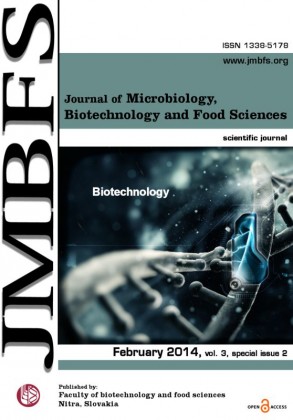EFFECT OF QUERCETIN ON ANTIOXIDANT STATUS OF RABBITS AFTER ONE MONTH EXPOSURE
Keywords:
rabbits, quercetin, superoxide dismutase, glutathione peroxidase, gender comparisonAbstract
The aim of the present study was to investigate the short-term effect of quercetin in various doses on level of antioxidant enzymes in rabbit’s blood. Adult rabbits were divided into three experimental groups (E1, E2 and E3) and the control group without quercetin addition. Quercetin was applied intramuscularly in various concentrations; 10 µg.kg-1 in E1 group, 100 µg.kg-1 in E2 group, and 1000 µg.kg-1 in E3 group for 30 days, 3 times per week. Application of quercetin insignificantly increased the level of SOD in the experimental groups in comparison with the control group. Gender comparison showed higher level of SOD in all experimental male groups in comparison with the female groups. The level of GPx activity decreased in all experimental groups but without significant differences. In gender comparison we found higher activity of GPx in female groups in comparison with the male groups. In conclusion, as the quercetin serves in organism as antioxidant with the ability to scavenge free radicals, our results could contribute to the positive effect of quercetin on antioxidant balance, however further studies are needed.Downloads
Download data is not yet available.
Downloads
Published
2014-02-01
How to Cite
PetruÅ¡ka, P., Zbyňovská, K., Emrichová, J., & Capcarová, M. (2014). EFFECT OF QUERCETIN ON ANTIOXIDANT STATUS OF RABBITS AFTER ONE MONTH EXPOSURE. Journal of Microbiology, Biotechnology and Food Sciences, 3(special issue 2 (Biotechnology), 148–150. Retrieved from https://office2.jmbfs.org/index.php/JMBFS/article/view/7641
Issue
Section
Biotechnology
License
Copyright (c) 2014 Peter PetruÅ¡ka, KatarÃÂna Zbyňovská, Jana Emrichová, Marcela Capcarová

This work is licensed under a Creative Commons Attribution 4.0 International License.
All papers published in the Journal of Microbiology, Biotechnology and Food Sciences are published under a CC-BY licence (CC-BY 4.0). Published materials can be shared (copy and redistribute the material in any medium or format) and adapted (remix, transform, and build upon the material for any purpose, even commercially) with specifying the author(s).

